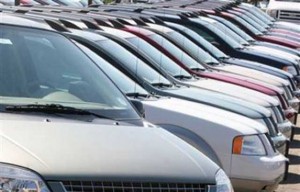
Strong auto sales have helped automakers and suppliers provide better than average shareholder returns since the financial downturn of 2008.
Few economic sectors have mounted a more impressive comeback from the financial crisis in 2008 than the auto industry, according to a new study by the Boston Consulting Group (BCG).
The study found that auto manufacturers and component makers delivered five-year median annual returns that were well in excess of the 21% median return for the 26 industries tracked by the group.
On average, carmakers produced a median annual total shareholder return, which traces both dividends and share price appreciation, of 29% from 2009 through 2013, while component makers posted a median annual TSR of 33%.
In addition, both carmakers and their suppliers “look set to maintain their momentum,” the group’s report said.
In the U.S., the financial crisis led directly to the bankruptcy of General Motors and Chrysler and left European carmakers such as Peugeot, Fiat and Renault struggling to stay afloat. Japanese carmakers, such as Toyota and Honda, which had seemed invulnerable before the crisis, also suffered setbacks to their global ambitions.
Nonetheless, while the general climate may be improving, individual carmakers and their suppliers should not “count on a rising tide to lift all boats,” according to BCG Senior Partner Xavier Mosquet, who is the co-author of the report, adding that specific moves by individual companies will determine the future winners and losers.
“OEMs and component makers will have to prioritize innovation to meet the needs of consumers,” Mosquet said.
BCG found that companies that concentrated on emerging markets produced a median annual total shareholder that ranged from 36 to 49%, creating value primarily through a combination of margin improvement and sales growth.
Meanwhile, automakers that focused globally on developed markets posted lower median annual returns that ranged from 23 to 35%, creating value in large part by expanding their profit margins, rather than increasing sales, and returning cash to shareholders through dividends and share repurchases.
Also the passenger-vehicle subsector posted a median five-year annual total shareholder return (TSR) of 30%, while the commercial-vehicle segment showed an 18% median annual TSR.
The report also said from 2004 through 2013, the five largest manufacturers by total sales posted a 47% increase in combined unit sales.
(Volvo reveals new XC90; bets future on redesign. For more, Click Here.)
“Global scale not only helps (manufacturers) remain competitive on costs but also positions automakers to capture share in high-growth markets and solidify their competitive advantage” as the experience of Hyundai and Volkswagen demonstrate, the report said.
The top 10 component makers (by size) from 2004 through 2013 achieved a 67% average increase in revenues
(Click Here for details on the latest filings to the GM victims fund.)
Vehicle makers from emerging markets dominate the top five- and 10-year rankings and three China-based passenger carmakers, Great Wall Motor Co., Brilliance China Automotive and Changan Automobile, lead the top 10 list of five-year returns.
(To see how much more aluminum will be used by automakers, Click Here.)
Meanwhile, Tesla Motors and Harley-Davidson are the only two North American manufacturers to appear in the top 10 during the past three years, BCG said.
Three companies, exterior-parts supplier Plastic Omnium, manufacturer and distributor Dorman Products, and Indian tire maker MRF or Madras Rubber Factory Ltd., ranked among the top-10 performing components makers across the three-, five- and 10-year periods.
